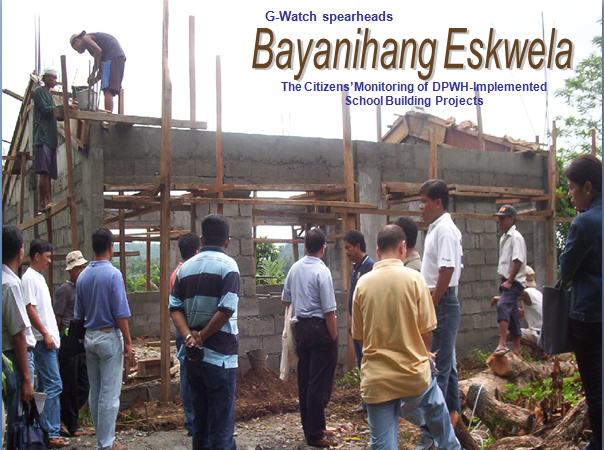Bayanihang Eskwela 2 (Community Spirit for Schools), a social accountability project that monitored the construction of school buildings in the Philippines, has been included as among good examples of civic engagement in accountability in a new United Nations Development Programme (UNDP) global report.
This project was launched in June 2009 by the Government-Watch (G-Watch) program of the Ateneo School of Government, the graduate school of leadership and public service of the Ateneo de Manila University.
Bayanihang Eskwela 2 counted as stakeholders, on the government side, the Department of Education (DepEd), Department of Public Works and Highways (DPWH), Office of the Ombudsman, and the Civil Service Commission (CSC). Civil society partners were the Boy Scouts of the Philippines (BSP) and the Girl Scouts of the Philippines (GSP).
For Bayanihang Eskwela 2, G-Watch established constituencies in 24 school building project monitoring areas: 10 in Batangas and Quezon Provinces, and in cities in Metropolitan Manila; 4 in Negros Occidental Province; and, 10 in Mindanao, including Maguindanao Province. The project also established some 20 Community-based Monitoring Teams. Members of these teams came from the Boy Scouts, Girl Scouts, Parent-Teacher Associations, school officiers, and local Engineering Offices of the DPWH.
UNDP supported the project under its “Building Integrity in the System of Governance project for the Philippines”, which ended December 2009. Managing partner of the UNDP was the Civil Service Commission.
Bayanihang Eskwela 2 ensured that quality school building projects in its project areas were constructed in areas where they were most needed, particularly in schools that were low performing and had acute shortages in school facilities. It convened both private and public sectors in a joint monitoring effort that used clear, simple and easy-to-use monitoring tools.
The project trained school heads, parent-teacher associations, and representatives of Girl and Boy Scouts in the use of a monitoring tool to check the bidding and construction of their school building. The tool included indicators such as adherence to specific procurement rules, quality of materials used, and presence of specifications included in the contract. It covered all stages of school building construction—from procurement to post-construction.
Bayanihang Eskwela 2 made critical government procurement processes transparent and helped to prevent corruption. Contractors became more responsive to government and community needs by correcting errors detected by volunteer monitors. Community involvement was vital in ensuring quality public services and in educating citizens of their important role in good governance.
Government agencies involved in Bayanihang Eskwela have been welcoming of the project. “Civil society organizations play a crucial role in calling the attention of the government when targets are not met,” says DPWH Undersecretary Bashir Rasuman. According to one report, the DPWH admits that it can monitor only 10-15% of the estimated 30,000 school building projects it carries out every year.
In a report on Bayanihang Eskwela, the Civil Service Commission said the project helped to reduce the opportunity for corrupt transactions. At the same time, it increased the likelihood that these will be reported. The CSC also noted improved efficiency in and higher quality standard of school building construction projects owing to Bayanihang Eskwela.
The CSC has recommended another round of Bayanihang Eskwela 2 for future school building projects in other areas. Among its action plans is to institutionalize Bayanihang Eskwela 2 as a program of the DPWH and the DepEd, especially in areas where there is acute shortage in school buildings and facilities.
Dr Antonio La Viña, Dean of the Ateneo School of Government, believes this project not only prevented corruption in government, but also makes contractors more responsive to their clients. It established benchmarks in DepEd and DPWH performance and empowered local communities in checking delivery of public school services. “The focus of Bayanihang Eskwela was not fault-finding. The focus was to deliver the services,” he adds.

